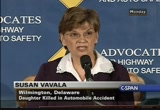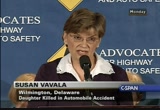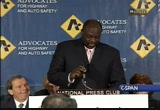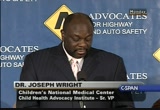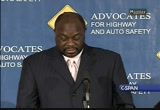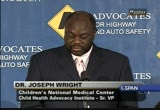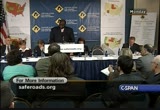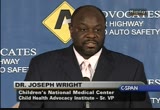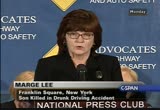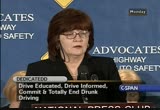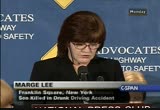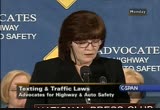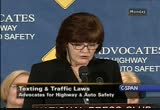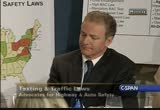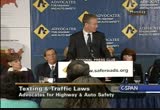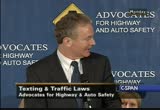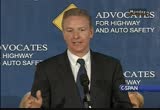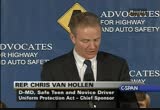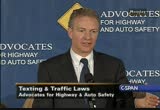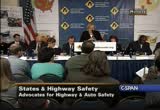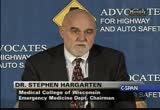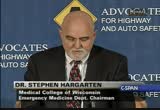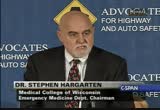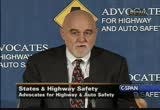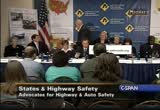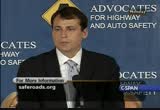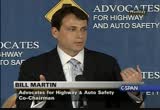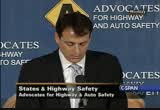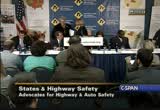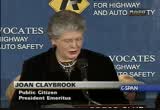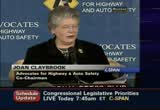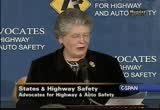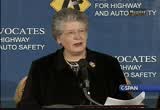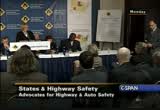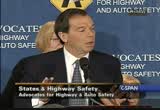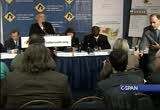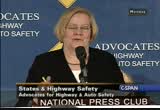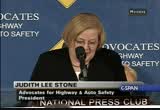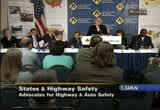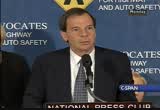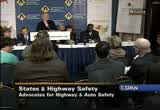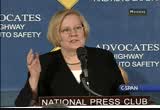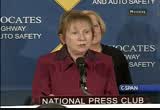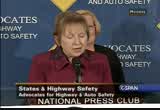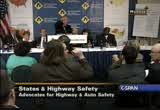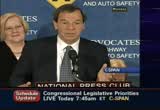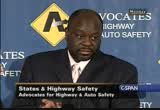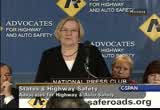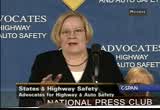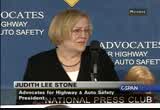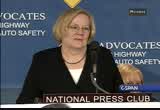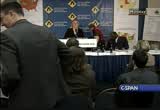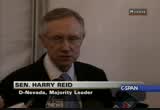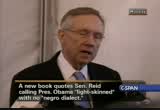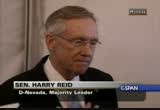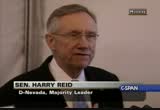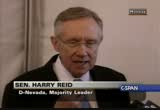tv Today in Washington CSPAN January 12, 2010 6:00am-7:00am EST
6:00 am
the purpose of g.d.l. and the stand-up act is not to punish, but to protect. to give them time to learn to deal with distraction and road conditions under the guidance of an experienced adult. it empowers parents to say no, to allowing their children to ride with peer who is lack the good judgment or experience the keep them safe. we must relewis property damage and personal injury or lives lost due to driving with lack of experience. it shatters your world and destroys your dreams. it is terrifying and it is random. our personal tragedy has taught us a hard lesson. kim and many others have died and many more have been injured because the old system failed to
6:01 am
provide for the most important factor of all, experience. . vision. since it was implemented in june 1999, the delaware law is one of the strongest in the country, and the most successful tools in reducing crashes and 16-year-old drivers by almost 16 60%. it's my sincere hope that states which have not implemented a strong anprogram will do so. it's time to help all of our children to make better choices children to make better choices based on t that comes only with experience. thank you for your dedication to making roads in every state safer for all of us. thank you. [applause] >> thank you very much, susan.
6:02 am
next we will hear from dr. joseph wright, who is representing the american academy of pediatrics. he brings the perspective of many years at the center here in washington. he heads the child advocacy institute. we are delighted that you could join us. >> good afternoon, everyone. my name is dr. joseph wright. i'm a pediatric emergency physician and the senior vice president at children's national medical center. i had to the child health advocacy institute. i practiced in level one trauma centers for more than 20 years. i was direct witness to the fact
6:03 am
that motor vehicle crashes continue to be the leading cause of death for 16 to 20-year olds in this country each year. approximately 450,000 teenagers are injured each year. of those killed, approximately 63% of our drivers and 37% are passengers. 2/3 of the passengers who die in car crashes are male. what we have to remember in what we have already heard is that each and every one of these cases represents an individual and family tragedy. lives end and changed forever. as the father of two young men in the highest risk category, i'm not only professionally concerned, but very personally concerned about this on a daily basis. the american academy of
6:04 am
pediatrics has a long record of supporting child safety measures in transportation ranging from car seats to teen driving safety, and every stage in between. we applaud the 2010 roe knapp reports. since it was first published in 2004, this report has highlighted the need for every state to institute a comprehensive auto safety laws, and to protect individuals of all ages. the model safety laws reviewed in the 2010 road map have a direct impact on the number of children and teens injured or killed in motor vehicle crashes. studies have shown the states with strong primary enforcement seat belts laws, graduated driver's license programs, and required child safety booster seats had lower auto injuries
6:05 am
and fatalities than states that did not. nonetheless, today, most aides have not implemented a three d-stage graduated licensing program. the american academy of pediatrics calls upon every state to pass this. the adolescent, as a novice driver, lacks the experience. compared with the experienced drivers, the novice adolescent driver is less proficient in detecting and responding to hazards in controlling the vehicle. 16 to 19-year-old have a crash rate more than four times more than adults. passing stronger teen driving laws will provide them with
6:06 am
practice and support they need to be to be responsible drivers. we can protect teenagers and everyone else on the road. in addition, the report highlights the need for mandating shall brewstebooster s -- mandating child booster seats. this will mean that fewer young people will be in serious and preventable injuries. i really want to stress the fact that these are preventable injuries. when i teach my public tells students at george washington university, we talk about the three e's of prevention. engineering, education, and enforcement. the industry is doing what they need to do with regard to engineering. in regard to education, the programs are doing what they need to be doing in terms of educating the public. with regard to enforcement, we
6:07 am
really need to level the playing field. as was mentioned by senator cullerton, we can level the playing field with the stroke of a pen. it is ludicrous for me to practice in the national capital region, where we serve states that are at the top of the list , and states that are in the worst part of that list is virginia. we need to strengthen that enforcement-arm of this prevented activity. i would like to never see another injury or death resulting from a motor vehicle crash. as a parent and a physician, i can attest that automobile safety laws benefit children, families, our society, and our system as a whole. let's work together to assure that every state has the highest level of protection for everyone on the road. thank you for your attention
6:08 am
this afternoon. [applause] >> thank you very much, dr. wright. next we will hear from another mother who has lived with a terrible loss and a personal injury for many years. marge lee is also a political activist in the state of new york. she has turned her grief into changing laws and making it a better world for other people. i'm very thankful she is here with us today. >> good afternoon. thank you, judy. my heart goes out to susan. we are both members of an ever- growing group of victims who suffered incomprehensible loss because of preventable runway crashes. in 1990, my family was returning
6:09 am
home to new york. we never made it home. we were hit by a drunk driver in new jersey. a 25-year-old stepson was killed 3 my 5-year-old son and my 3-year-old daughter were injured. i sustained multiple life threatening injuries and came close to death. there has been progress in the last 30 years. the war is not yet won. but 2010 high with report card shows that all states have adopted model drunk driving laws -- not all states, including significant penalties for impaired drivers who endangered child passengers. new york recently enacted a law that holds accountable anybody who puts a child passenger at risk. it is named for an 11-year-old.
6:10 am
she got into the car with a friend's mother. that mother was arrested for dwi. under the of law, those convicted of dwi with a child passenger will be charged with a class e felony, and face four years in prison. if the child is killed, they could serve as long as 20 years. we all know that drunk driving has long been a factor in fatal crashes. in 2008, about 1/3 of all highway deaths were higalcohol related. there's another rapidly growing threat to our safety, distracted driving, including texting while driving. a wide body of evidence shows that the use of cell phones dramatically reduces reaction times, perhaps as much as alcohol. a 2009 study from the virginia tech transportation institute
6:11 am
found that text messaging increased the risk of crashes by more than 23%. only 15 states and the district of columbia currently ban text messaging for all drivers as a primary offense. that means a driver can be pulled over for that. even though my state of new york passed a restriction ninth 2009, the law classifies texting while driving only as a secondary offense. it is a step in the right direction, but it is not enough. advocates is right to have added the all aged texting ban. texting while driving as a secondary offense is too weak. the new york senator agrees. there's another representative in washington state with the same type of legislation.
6:12 am
like all of us here today appealing for greater diligence and protecting all drivers, is my sincere hope that more state lawmakers will sponsor bills to restrict distracted driving, and the tenacious until they become law. there has been a lot of focus on teens and texting, and rightly so. it is all too often a deadly combination behind the wheel. this is why my organization is in strong support. it has joined the safe road for teenagers coalition to push this legislation through congress. every state should have tough graduated driver's licensing, including cell phone and texting bans. as a mother who lost a child to impaired driving, a woman who nearly lost her life in the crash, and a committed
6:13 am
advocate, i appeal to every governor end every state legislature to make 2010 the year where we will see strong ignition interlock, teen-driving laws, and texting bans for all adults become a reality. there's no doubt it will save lives. thank you. [applause] >> thank you. it's my pleasure to introduce our next speaker, rep chris van hollen. he represents the district eight in montgomery county and maryland. he is a member of the house ways and means committee. before serving in congress, beginning in 2002, rep chris van hollen was a member of the maryland general assembly, where he was consistently a reliable and effective champion of highway safety laws in maryland. he's now one of the original
6:14 am
sponsors of the stand up act standhr-1895. we welcome you and appreciate your leadership. >> thank you. let me commend and applaud advocates for highway and auto safety for compiling the report that is released today. judith lee stone, thank you very much. jackie gillan, thank you. and the delegate who is here -- a friend and one of the leaders in a marylanthe maryland general assembly. i've had the pleasure of working with him on this important legislation. most especially, i want to think anks the moms for sharing
6:15 am
their personal stories, their stories of family tragedy, and for them working so diligently to try to make sure we do not have more family k@@ h vh hs we have seen significant progress in this country in driving safety laws, mothers against drunk driving have made an impact and others. we know from the continuing tragedy is that much more work remains to be done. this is an area where we need to continue to work, to move ahead e federal level. this report, as you know, has a slew of recommendations with respect to traffic safety and avoiding crashes. i want to focus specifically on the teen crash situation.
6:16 am
in the family. i think all parents worry, understandably so, when they're teenagers and other young drivers get into the car. whether they are driving themselves were getting into the car with a teenage friend. that is why it is essential that we, at the federal level, provide an impetus to the states to move forward in developing the gdl requirements but i'm proud to have joined with my colleagues, jim bishop and mike castle, who are the chief sponsors and authors of the stand up legislation, which is a bipartisan legislation, to try to use leverage we have that the federal level to prod states to move in the right direction. there have been states in the
6:17 am
past where the federal government has intervened to try to create a uniform set of standards, and standards that we know have worked. if you look at the graduated driver's license programs in places where they have been enacted, you have seen up to a 40% reduction in teen-driver crashes. that is important progress. the toll is significant and continues to be a source of great tragedy in this country. it's important to understand that behind all these statistics are the kind of stories we have heard. if you look at the overall numbers, they are something that cries out for a response to the state and federal level. 10 teenagers are killed in the united states each day as a result of motor vehicle crashes.
6:18 am
in my state of maryland, over the past five years, crashes involving teenagers have claimed 579 lives. over the last decade, you have seen 80,000 deaths in crashes involving teen driving. that is a staggering figure. we invest a lot of resources to fight diseases in this country, as we should. we need to treat this as a public health emergency. these are preventable crashes. we need to rally with the same kind of urgency as we would if you had a disease taking hold on our children. thank you for working with us to pass this legislation, so that
6:19 am
we can make sure our teenagers and all our family members are better protected as they head out on the roadways. nobody is invincible. we want to make sure we take every action we can come as a country, to moved in the right direction. thank you. we are very hopeful we can get this legislation moving. as i said, it has bipartisan co- sponsors of. it is common sense. what we need is for all the people who have gathered in this room and throughout the country to recognize that they have an important stake in the success of this bill, and help us get it passed. thank you for your efforts. [applause] >> thank you very much, a congressman chris van hollen. thank you. next, dr. stephen hargarten.
6:20 am
he has been at the forefront in the state of wisconsin, trying to get good highway safety laws passed, and he is also on my board of directors. dr. hargarten. >> thank you. i am the chair of emergency medicine at the college of wisconsin, and at a level one trauma center. i've been doing this kind of work for over 30 years. i first want to congratulate our congressional leaders who are with us today, and also our state legislatures, who, as senator cullerton made reference to, by the push of a button, he can save lives. you all will be able to save more lives by the stroke of a policy penn then i can do --
6:21 am
with a policy pen than i can do with surgery. the most difficult thing i have to do as an emergency physician is not to have to go through the critical details of patients clinging to life. it is to tell mom that their daughter has passed away, or suffered lifelong brain injury. that is the hardest thing that i do. that is what i do not want to do. our partners in public health at the state and federal level make my job easier. over the past several months, we have witnessed a health care reform debate, and have heard
6:22 am
the important arguments for reducing health-care costs. over the past decade, tens of thousands of americans have died and hundreds have been injured, requiring costly treatments. costly and permanent injuries, traumatic brain injury, spinal cord injury, extremity injuries with lifelong disabilities. our nation's policy makers, both state and federal, have solutions to health care costs in their respective communities. yet, many of them choose not to act. for those states to have comprehensive gdl primary enforcement laws, and especially my neighbor to the south, ill. -- we do not typically talked favorably about illinois in wisconsin, but in this case, illinois is a shining example.
6:23 am
these states benefit. others outlined in the advocates report, also. for those states who do not choose this pathway, lives are lost, and taxpayers pay more with increase medicaid costs as an example. the evidence based policies -- these state prescriptions for health to prevent death and costly disabilities are available, yet there is inaction. i do not use all the tools at my disposal to save a person's life, i have fallen below community standards. i and my colleagues cannot do this alone one patient at a time. the state and federal policymakers need to do more. they have the policy tools. they have a road map.
6:24 am
they have a road map to safety. i ask them to use them. in act like saving policies. we ask that you do everything you can do to save lives and reduce costly injuries. over the past decade, my colleagues and i in pediatric emergency medicine, emergency nurses, trauma nurses, social workers, and others have treated hundreds of thousands of people damaged, torn, bruised, lacerated, many permanently affected from car and motorcycle crashes. families and friends have seen them die, disfigured, or disabled. during these historic times for health care reform, let's make sure we use all of our policy tools and save lives. thank you very much. [applause]
6:25 am
>> thank you very much, steve. we have two more speakers, bill martin of farmers insurance, and joan claybrook. >> good afternoon. i am bill martin with farmers insurance group. hopefully you'll stay for my talk in spite of that. [laughter] it is a very rare person who has not been touched by this public health issue, but even those of us who have not been directly involved might take a moment right now to think about the risk to our lives. we all understand risk. many of us buy insurance to protect us from those risks. insurance companies can never fully protect from the emotional traumaof an auto accident. farmers insurance and the other
6:26 am
members of the advocates board, the other insurance company members, believe that passing effective laws will do our policyholders a favor we cannot do them. i think they would much rather avoid the accident then have us pay for. they would much rather have that date bacy back. without assertive legislative actions, the type of action you see in the 2009 s stand up act, we will all be disposed even more unnecessary risks. i ask you to take a moment and take a little journey with me. if you close your eyes and think about nighttime on a two-lane road driving the speed limit, 45 miles per hour, and driving in thone direction.
6:27 am
another car comes in the other direction. as one author calls this, public trust at that moment. public trust of an idea that person will act responsibly. think about being behind your will and what is happening behind the other wheel. is it somebody who does not have the experience that you have? is it a group of teenagers playing with the radio? maybe the driver is getting a text message and they're looking down to see who it was just for the instant. just for the instant that it takes to cross over the center line, and that it takes you, the responsible driver, to change your life permanently. statistics show that teens have a far disproportionate number of these accidents happening to them than anybody else. they have not learned with those of us who are getting older.
6:28 am
and so we ask for the oversight of the lawmakers to protect us from behavior's that will make our roads less safe. we're all at risk for making bad choices. the insurance industry knows that proven, effective laws, such as graduated driver's license, help teach us about the risks and how to avoid them. our colleagues will continue to join together with safety, consumer, and public health groups to urge that these important laws be passed in the states and in congress. they help us all keep on the right side of the center line, which i think is probably the best insurance policy for all of us. thank you. [applause] >> thank you very much, bill. the bill is the insurance co- chair of our board. i want to have the consumer co- chair of our board, and joan claybrook, come to the podium.
6:29 am
>> this is the wrap up. as an administrator of the national highway safety transportation in the carter years, i solve the difficulty of changing driver behavior. that laid the groundwork for many successful federal and state programs that we have today. and that we're advocating for tomorrow. it's a great honor to hold that job because of the opportunities to save lives and reduce costly injuries. today i serve as the co-chair of advocates. i knowç that the insurance industry has been instrumental in helping make the work of advocates possible, and to help reduce highway deaths and
6:30 am
injuries. we were just beginning to understand that passing safety laws in combination with public education, would change@@@@@@åå) slogans and publicity campaigns without enforcement have never worked and they never will. in 1978, during my tenure, the first child restraint law was passed in with our strong support by the been 1980's, every state had a law requiring that small children right in child safety seats. it was not long before the statistics bore about the wisdom of this life-saving policy initiative, specific traffic safety laws, in portsmouth, education, the three that make people change their behavior as well as advances in the design
6:31 am
of child safety seats and the design of cars no longer are motor vehicle crashes the number-one killer of infants and toddlers as in decades before. the same success as occurred in reducing drunk driving that resulted when congress and the states passed tough loss and imposed tough penalties on impaired drivers. by 12% during the carter years to 80% today. we know these numbers could be further improved. our nation is in the middle of another raging debate on how to improve universal health care, reduce economic burden on our society. there may be differences of opinion on how to achieve these goals. there's universal agreement on prevention being the key. passing traffic safety laws is the cornerstone of prevention. we have known for years through peer review research that laws
6:32 am
rated in the advocates road map are proven to save lives and reduce the costs to our society. as of today, not one state has enacted all 15 laws in this report. many are missing primary enforcement seat belt use, a motorcycle helmet use, teen driving, drunk driving, and booster seat laws. this report should be the blueprint that congress uses. it could save millions for year. everyone has a stake in advancing these laws and saving lives. state legislators, governors, executive branch officials, businesses, public health and safety groups, medical personnel, the media, and most of all, the american people, who could avoid a devastating trauma and heartbreak that we've heard
6:33 am
about today. it is senseless for our public officials to allow another year to pass and to accept the nearly 40,000 people who die each year, and over two million who are injured. this report is a wake up call for everyone that legislative action is urgently needed. let's make it happen. thank you very much. [applause] >> thank you to all the speakers. thank you for being here. it is time to take questions from those of you for in the room. do you have any questions? if you would ask your question in the microphone, that would be helpful. >> i am from "the washington post." as you lobbied the state legislatures and congress for these laws, can you be specific
6:34 am
in telling us who is lobbying in the other direction? who are the specific lobby's pushing against them? >> john cullerton will take that one. >> there's one organization that lobbies against laws against laws. that is the one law the state of illinois has not been able to pass. unfortunately, they're very effective. for the most part, the other statutes are laws where there is no organized opposition. the health community lobbies for it. there's a perception in certain legislature's mines that their constituents may not like it, that some of the parents of teenagers who will not get their license until they're 16 and a
6:35 am
half may be against that. it's a perception that has to be overcome. it can be done. and let's not forget, we have made remarkable progress, as joan has outlined to come over the past 25 years. fatality rates have dropped. why stop? why not continue to save these lives? >> in regards to that, some of the problems that we face has to do with the judiciary. they felt that the penalty was sufficient. they felt the cost of the interlock was an additional burden. they did not request it be put in. they had the choice, and chose not to.
6:36 am
>> is there another question from the press? can you get the microphone back there, please? thank you. >> i work for a public radio station in los angeles. asking about california, which got a green light, there were a few things i did not understand. one was the booster seat. how could that be improved? can you talk about laws about teen driving, and anything else you think we could do better? >> on booster seats, the reason california gets half credit is because they do not cover children through age 7. we have tried to get that passed in california to raise the age. that is the optimal law. we do give a half credit if you have something, but.
6:37 am
not the. on the gdl laws -- the graduated driver's license, in california, on the laws we included in the report, that california needs to have a 16-year-old age for the learner's permit. they still need a night time restriction that does not have secondary enforcement. we do not count the law if it is secondary enforcement. secondary enforcement means they have to be stopped for another reason before they can give eight ticket. -- a ticket. they also need a passenger restriction, which they have, but it has a secondary provision. we do not count that. there are a couple of others. cellphone restrictions for teens. it only bans texting.
6:38 am
those need to change. just make them primary enforcement. all highway safety laws used to be primary enforcement. let's go back to that. also, there are some counties in california that have laws have laws for first-time offenders as a pilot, but we will like that to the statewide. >> i have a question from somebody from the internet. the question is -- i have not had a chance to read the press kit yet, but how you credit for half a lot when compiling the list? for example, nebraska has 6.5 of 15 model laws.
6:39 am
as i explained, if they have some of the law, we give them partial credit. we add up the numbers and that is how we get to a number like 6.5. in the case of nebraska, is that their booster seat law only covers up to age 5, instead of 87. that is why they get half credit for that. do we have any questions? from? -- from reporters? >> our question is for john cullerton. with states that have limited budgets, how do you try to enforce -- how do you encourage enforcement when there is? >>? they said the state spent an enormous amount of money on medicaid. many of the people in these crashes, if they're not on medicaid when they are first
6:40 am
injured, go on medicaid. we save money by passing these laws. in terms of enforcement, i think it's fair to say that a lot of these are still in force. when judy talks about secondary enforcement, that puts in the mind of the driver -- i can get away with not wearing a seatbelt because they will not stop me. that is why we have seen, in the states that have passed primary enforcement, the usage rate goes up by 12%. it is not because there's more police officers. theirself enforcement. it does not cost any money. -- there is self enforcement. it saves money. now is the time to pass these. >> thank you very much. any other hands? thank you. >> i am with fox 5 news.
6:41 am
what efforts are being made, if any, to push virginia to get up to speed, especially because we are so intertwined in this area with people crossing the border so frequently everyday? >> this press conference is one of the efforts. we are trying to highlight that these gaps exist. in the case of virginia, they could raise the status of a lot of their laws to primary enforcement, and it would have not gone into the red area. they have other things they need to do. i think the legislators need to look at some of the issues that senator cullerton has brought up. this is a cost issue. the money that we spend in this country -- $230 billion that we do not need to spend on motor vehicle crashes. if we -- this translates into a
6:42 am
crash tax. it is a lot of money. each state has a number assigned to them on how much money it cost them. this is a ready-made blueprint for them to cut down on those expenses. especially with these preventable statutes that can be passed. i hope that others will be working with us to try to change the status in virginia. we will be working in maryland, also. let's all work together to get that done. yes? >> as she said, the purpose of this report is to also rates the states and give them a grade. we will also be working with our safety partners. our board of directors is
6:43 am
comprised of the major health and safety and insurers. in virginia, strengthening the laws will be tried again. they have tried for years and years to get a primary enforcement seat belt law in virginia. we are hoping this report will give them another tool to go to the legislature and say virginia is a red state. you have dropped from yellow to red. we have gaps in our highway safety laws. virginia does not even have an open container law. many elements of the graduated driver's license are secondary. we're hoping we will take this collective group, and we will be working in the legislatures to try to help co-sponsors to get these bills through. as senator cullerton said, they are not easy battles. they are effective when you succeed, and they save lives and
6:44 am
they say cosve costs, but ther'a lot of resistance. i have worked on many bills where the committee chair has a lot of authority and economy, and for some reason does not want this bill to go through. advocates has worked for years on a primary enforcement seat belt law. we're hopeful that may be 2010 will be the year that we get some of laws. >> we are also in support of federal legislation that would help the states to take such action. there is legislation that has seen some activity in the house. the transportation bill that will be taken up this year, we hope that will remain in, and that will compel a number of the states to pass these laws. any other questions?
6:45 am
yes? >> i am also from abc, representing wls, for senator cullerton. it was mentioned that if you're you are in the yellow status you can dance to the green status. many of the states are really in the yellow and want to know what kind of steps you are actually taking to advance to the green, in regard to teenage driving. >> in illinois, the motorcycle helmet law is a bid -- very difficult to pass. i would not predict that would happen soon. the idea of moving back the
6:46 am
median age to 16 is a new proposal. i do not know that has been reduced in illinois. i will bring this to the attention of our legislature doors and have that introduced as early as a few weeks from now. i think there is only one minor tweak to nighttime driving restrictions and weekends. illinois would like to lead the nation and we are close to doing that. year to point us in the right direction that has done that. with regard to the motorcycle helmets law, in many ways we are playing defense. comany states are trying to repl them. dr. wright, do you want to respond? >> the question makes clear that the achilles' heel for many states rests with teen driving protection. the gdl laws is where a lot of
6:47 am
the states are falling down. moving the age of permit back in maryland from 15 to 16 as part of the graduated driver's license is where many states can improve their status with regard to this report. >> thank you. we will take two more questions. >> there's a lot of talk of distracted drivers and preventing individuals from using devices. as automakers' move to put internet access in cars and that sort of thing, what kind of pressure are you putting on that industry? >> good question. i'll take a crack at it. you are right. it has been astounding to see the speed with which some of
6:48 am
these devices are being proposed. we're very concerned. we have been concerned for years as some of the devices have been coming in slowly. they seem to be coming in much faster. we have spoken to the federal government on several occasions. in all cases, this is a federal government issue, not a state government issue. i think the national highway safety administration and others need to get on top of this. it will go crazy. it already seems like it is. what was the second part of the question? what are we doing about it? we do have a petition that we filed on truck-driver distracting electronic devices. the department is considering that. it goes a little lighter than
6:49 am
phone use. we expect we will get an answer in 2010 on that issue. >> the virginia legislature just passed a text messaging ban that was utterly toothless because it is secondary. more generally, how would you characterize the will and the intent of state legislatures everywhere in passing secondary enforcement bans on various things that become popular issues? >> i'd characterize it as a mistake. it used to be that primary enforcement was a lot of the land in all highway safety laws. i think it's a convenient way to compromise and to get bills passed in state legislatures. i think that it may be that we need to do a better job of educating people. .
6:52 am
the address iswww.safero ads.org. >> we have a lake at our website, c-span.org. [captioning performed by national captioning institute] [captions copyright national cable satellite corp. 2010] tom donahue will speak about the state of the business community heading into a lecture is. that begins a 9:00 a.m., eastern on c-span 2. later on the day, 84 on reallocating the broadband spectrum for public communications. a number of firefighters, sheriff, and police groups are meeting in washington to discuss the topic. live coverage begins at 5:00 p.m., eastern on c-span.
6:53 am
coming up in a few minutes, two days "washington journal." later this morning from the capitol, senate republicans talk to reporters. yesterday, senate majority leader harry reid says he could have chosen his words better regarding a 2008 quote on president barack obama's of race and election ability. his remarks are next on c-span. er>> there is a book that will e released later this week. would you like to explain more on that topic? >> i am very happy that barack obama ran for president but i have enjoyed working with them. it has been tremendous, a
6:54 am
terrific, my heart has been warmed from the response i have gotten around the country. whether it is julian bond, or coming here today, eric holder, the attorney general of the united states. he said that anyone he could do, he would do that. we have a lot to do. over the last couple of weeks, i have spent hours on the telephone with the president and others working through health care. i spent a long time with him yesterday and will continue to do this. we have a lot of work to do and will continue to do my best for the people of the state of nevada and this country. >> some have suggested that your comments were uncomfortable. how do you feel about that?
6:55 am
>> i really appreciate people writing nice things about me. there was a wonderful editorial "the los angeles today. i am proud of the fact -- i could still remember the meeting that took place in my office with senator barack obama, telling him that i think he will be elected president. i am sure there were others. he was kind of surprised that a democratic leader was calling the new center over as suggesting he could be elected president. my conversations with the highest ranking african-american in congress, tim clyburn from
6:56 am
south carolina, i feel good about people -- out to me. i have apologized to the president. i apologize to everyone within the sound of my voice that i could use a better choice of words. i will continue to do my work with the african-american community. as a very young man in the state of nevada, i was one of the leaders of the civil-rights movement in nevada. the governor and i worked hard to work out the consent to allow integration in the gaming community of nevada. moving forward, i am very aware of the fact that the first
6:57 am
african-american to serve on the federal court in the state of nevada was a direct result of the work i did. i got a call last night, it was late, i was surprised, from secretary ken salazar. he told me to make sure that you tell everybody you have been more diverse in the united states senate than anyone else put together. that is where we are and i will move forward and get health care done the next couple of weeks. >> you apologized to president barack obama and black leaders. what about of butter is? do you think you owe them an apology? -- what about the voters? >> i talked to the national leaders in the last few days.
6:58 am
the african american leaders in nevada, i told them just to call me. the present majority leader of the senate in nevada is one of my proteges. i am very proud of him. i am not going to dwell on this anymore. it is in the book. thank you all very much. >> did you know that the number one free application for your iphone is cspan radio? you can get quick and easy access to three streaming audio programs.
6:59 am
there's also a tablet links to all of our podcast, including q&a and afterwards. it is free and available from the at store. -- the app store. >> "washington journal" next. we will take your calls. later in the morning, senate republican leader mitch mcconnell, along with other gop leaders, talk to reportersdk÷ at afghanistan, u.s. foreign policy, and the 2010 agenda for the u.s. senate. that is why the 10:00 eastern. members of the u.s. house of representatives return to capitol hill today. coming up this hour, two reporters return as for the update. after that, former republican national
155 Views
IN COLLECTIONS
CSPAN Television Archive
Television Archive  Television Archive News Search Service
Television Archive News Search Service 
Uploaded by TV Archive on

 Live Music Archive
Live Music Archive Librivox Free Audio
Librivox Free Audio Metropolitan Museum
Metropolitan Museum Cleveland Museum of Art
Cleveland Museum of Art Internet Arcade
Internet Arcade Console Living Room
Console Living Room Books to Borrow
Books to Borrow Open Library
Open Library TV News
TV News Understanding 9/11
Understanding 9/11